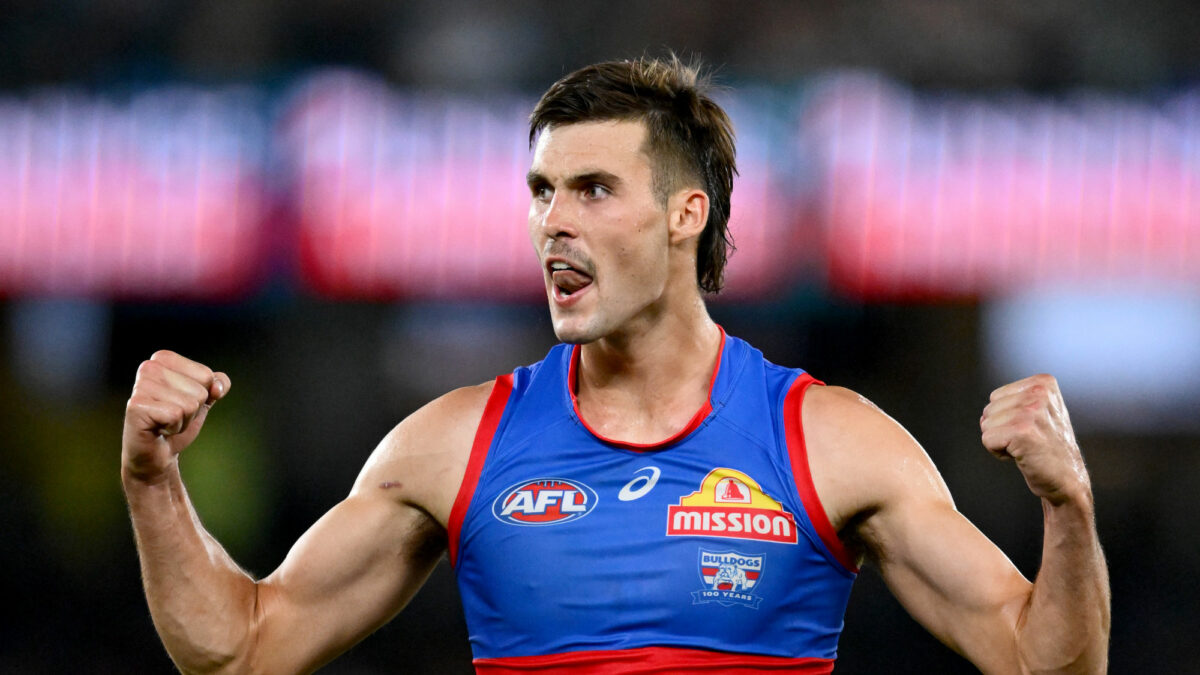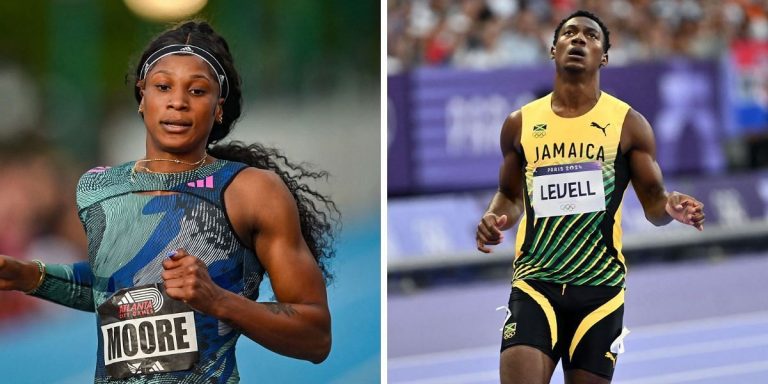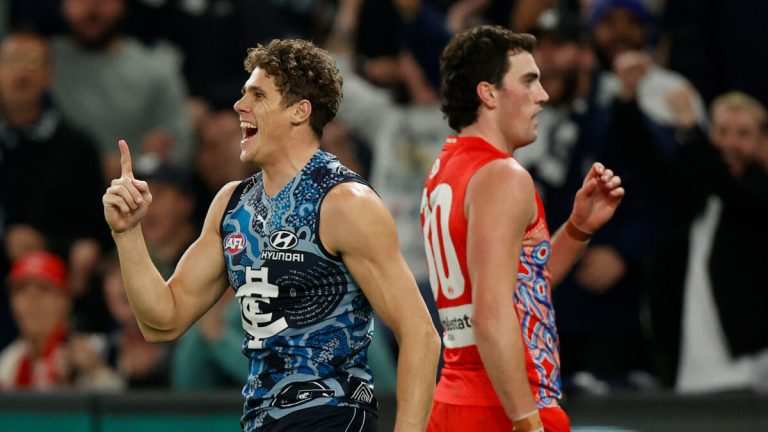The Western Bulldogs should not have won on Friday night.
They headed in without two reigning All-Australians, one of them the popular choice as the best player in the game, in Marcus Bontempelli and Adam Treloar. A key forward with limitless potential in Jamarra Ugle-Hagan, and the club’s premier small forward in Cody Weightman, extend that list of outs further.
They shipped the first four goals of the match to a Carlton outfit that looked more powerful, more dashing, more aggressive, better skilled – and most of all, looking keen to atone from two weeks of intense scrutiny.
When they pushed, the Blues pushed back harder – a run of goals in the second quarter answered back in kind, steadying majors arriving with regularity in the third term to keep them ahead just when it seemed the Dogs were primed to run over the top.
And yet by the final siren, it was the Bulldogs with the lead. With a team cobbled together with duct tape, prayers, a few names plucked from the VFL, a stand-in skipper, a reject who the opposition didn’t want, and above all, a hell of a lot of grit.
Success has many fathers, and there was plenty to go around after Friday night’s thriller at Marvel Stadium.
Sam Darcy, well beaten by a fine opponent in Jacob Weitering in the first half, was among the most influential figures on the ground in the second; a towering presence in the air, his competitiveness in the ruck, outstanding ground coverage and brilliant skills makes the man mountain about five different threats in one.
Sam Davidson is another Bulldogs success story from obscurity in the VFL; having seldom passed 20 disposals in the second tier, playing primarily as a forward, he amassed a lazy 31 as a wingman, running hard into open spaces all evening and driving the Dogs into attack time and time again.
Liam Jones was vital as the last line of defence in his first game back from injury, frequently repelling the Blues with timely spoils; Tom Liberatore was involved in everything, and in rare fashion was even more damaging with his run and carry on the outside as with his sharp contested work in close; Matt Kennedy’s Herculean final quarter in which he outcompeted none other than Patrick Cripps himself must have felt doubly sweet given it came against the midfield he was pushed out of last year.
But this is a win that has Luke Beveridge’s fingers all over it; both in how he has somehow marshalled a team minus so many of its stars into a working outfit, and in how he addressed the deficiencies that allowed the Blues’ four-goal head start, stopped the bleeding, and slowly but surely allowed his ragtag band to take control of the contest.
Among the most criticised coaches in the game, without a contract beyond the end of this season, Beveridge has seldom coached better than in the first three rounds; the result on Friday night was a win as meritorious as any in his decade in charge of the Bulldogs.
The Dogs’ main issue in the first quarter was one of spread: the Blues, once the footy was in their possession, were able to retain control for great lengths of time.
They had 43 marks to 18 by quarter time, with a 5-2 advantage inside 50, as well as 49 per cent time in possession to 34. Notable, too, was the Blues’ desire to move the ball quickly into space, with 73 of their 100 first-term disposals kicks.
The Dogs, meanwhile, were being hemmed in; consistently under pressure, unable to safely dispose of the ball without the risk of selling a teammate into trouble, Lachie Bramble’s indecisiveness before being pinged holding the ball in the opening minute proved a portent of things to come.
With 45 handballs to only 44 kicks, territory gains were minimal even with ball in hand, with the majority of their 16 inside 50s either shallow entries or hopeful Hail Marys that Jacob Weitering, with seven marks to his name, feasted on.
Transition goals were also a major issue; three of the Blues’ four for the term came from defensive 50 possession chains, swarming back in numbers around the ball when defending, and then shooting through the Dogs’ high press into open space in their own attacking 50.
Once Zac Williams jinked past Tim English – the first of a number of awful moments on a dirty night for the Dogs ruckman – on this run, only two Bulldogs, both well spread apart, stood between him and the goals; in the end, it was the simplest matter in the world to chip to Charlie Curnow 45 out, who had an entire 50m arc to work in.
Everytime the Bulldogs went forward, it was to a congested 50, with bodies everywhere, and with Darcy being neutralised by Weitering, they seldom looked likely to score; the Blues, by contrast, looked dangerous heading into a frequently wide open 50, and with quick ball movement – and some vastly improved kicking compared to last week, from Adam Saad in particular – cashed in.
The change in the second term was subtle, but began with pressure – the Dogs, down at a poor 150 pressure rating in the first term, leapt it to 195 in the second.
With that meant slower Blues play, a less open 50, and with it, more struggles scoring on the rebound. It also meant narrowing the channels going into attack – with just 16 marks in the second term after 43 in the first, the Blues weren’t able to spread as effectively, allowing Bulldogs time to crowd space inside 50, and denying the sort of wide-open spaces that cruelled them in the first.
Of course, it was at this point that the Blues started to dominate at stoppages, kicking three first-half goals from centre bounces and exposing the Dogs’ vulnerable, Bontempelli-less midfield. Tom De Koning was front and centre in everything, towelling up English to give the Blues’ midfield first use, when it wasn’t himself driving them forward. But you can’t win them all.
Amid all of it was a clear shift in the Dogs’ approach – where in the first quarter they had handballed themselves into corners and been overwhelmed by the Blues’ tackling pressure, from then on their first instinct was to kick, gain in territory, and get the ball into the open as much as possible.
It was here where Davidson began to rack them up: holding his space on the outer wing and being used regularly, he took eight marks in the final three quarters and 24 disposals. With 24 of his 31 possessions uncontested, the Blues paid a heavy price for paying him minimal respect and allowing their own wingmen, particularly Blake Acres, to be frequently sucked into the contest.
The most obvious key to the turnaround, though, was the Bulldogs’ ability to score from turnover. Up to half time, they had managed just a single goal from that source – according to Fox Footy, their seventh-worst opening half under Luke Beveridge.
But six of their eight second-half goals were generated from turnovers, and with half of those from forward-half intercepts, the cause was clear: a ferocious, high press in which the Dogs left their backline vulnerable to goals out the back, but backed themselves to control territory, and stoppages especially, enough to get over the line.
So while it left goals like this an occupational hazard…
… the result was a desperate, fatigued Blues who have faded in the last quarter in all three of their matches to date this season, forced to defend against repeat entries and with the menace of Darcy to contend with.
The sealing goal summed up the change in fortunes perfectly – it was everything that didn’t happen in the first quarter for both sides.
The Blues hit targets everywhere in the first quarter. Nick Haynes can’t find his before Bailey Dale knocks the footy away.
The Blues had tackled ferociously in the first quarter. Not one of them lays a hand on Dale as he follows up his spoil and works his way through traffic.
The Bulldogs had over-handballed in tight spaces in the first quarter. Dale kicks long, and with purpose.
The Bulldogs had had a crowded forward 50 in the first quarter. Dale’s kick is to a one-on-one in the goalsquare, James O’Donnell and Mitch McGovern, the pass perfectly weighted to his teammate’s advantage.
Such a goal was not possible with the way this game was played in that first term. It is to the Dogs’, and Beveridge’s, supreme credit that this ragtag band of misfits turned a game that was spiralling out of control back on their terms, gnawed away at the deficit, and in the final stages threw everything the Blues had dished out to them back in their rivals’ faces.
Wins scarcely come more admirable than that.






